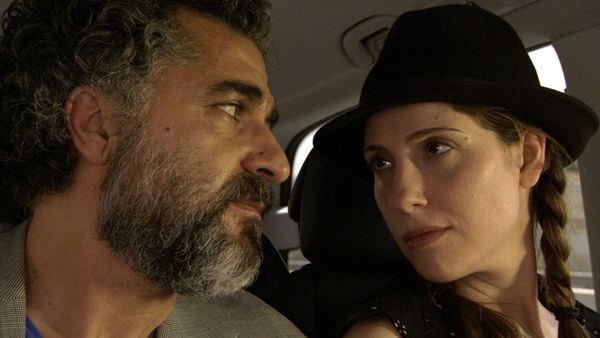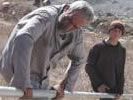Eye For Film >> Movies >> Atash (2004) Film Review

Atash begins in an arid and derelict settlement, where a small group of people appear to be trying to produce supplies. An Arab family is stoking a fire to make charcoal while the weather beaten and soot covered father watches on. A boy emerges from one of the huts, the contrast between his vivid turquoise shirt and the man’s a symbol of the divide between old and young, tradition and change. When he runs off (To school, we later find out), the man destroys the water tank, its contents parching the barren floor.
Atash translates as “thirst” in Arabic, and though the struggle and need for water are central to this film, writer-director Tawfik Abu Wael makes the relationship between the members of the family and with where they live symbolic and fascinating.Wael dissects the Israeli-Palestine conflict and patriarchal, masculine Palestinian society to great effect. It is thirst for more than water that the characters struggle - it is for life, freedom and acceptance.

Ironically, the destruction of the tank by the father, Abu (Played terrifyingly by amateur Hussein Yassin Mahajne), is an act that firmly places them in the abandoned settlement. Now that the supply is gone, Abu will have to build a water pipe to lead from far on the other side of the hill, and once that’s been built, why leave? Abu can afford to rent a house in town, but he has his own interests for staying put. His daughter, Jamila (Roba Blal) was the subject of sexual humiliation at the hands of a local a decade ago which he believes has shamed the whole family. He is still rooted in chauvinistic ideals of honour, and when Jamila wanders off in her own break for freedom he punishes her for her breach of gender boundaries and tradition.
Abu is unable to change with the times, as symbolised by his refusal to give up the idea of the water pipe. He resents his son Shukri getting an education and doesn’t even want the family listening to music on the radio. And then of course there’s the gun to guard the pipe, violence never changing anything, something that Wael regrets, given the film’s grim finale.
The extreme lengths Abu goes to guard the pipe, his way of life and his position within his family all suggest Wael’s exasperation with the conflict and even the inability of Palestinians to adapt and accept. The Israelis are always off screen, be it the settlement they once abandoned, or the rumble of the car of a forest ranger as father and son hurriedly cut down trees to burn. But their threat is ever present, and also what appears to keep Abu stuck in his rut.
It’s an interesting conclusion for the first Israeli-Palestine joint film production, and perhaps part of the reason why it has not been screened in other Arab countries in the Middle East.
It’s slow-moving art house fare, and those who prefer more to be revealed by what is said than left unsaid would do well to avoid, but its impact is mesmerising. The vivid cinematography of dry grey and arid red evokes the sensation of thirst throughout, and like in Brazilian ghetto drama City Of God, non-professional actors are used to convey feelings that professionals might never be able to comprehend.
Wael draws impressive and raw performances from his cast, and it is on the strength of these that the film gains its greater meaning above being simply a fraught family drama. Like the barren wasteland surrounding the village, Atash is a drama of harsh realities, and well deserving of the awards it picked up at festivals around the world.
Reviewed on: 09 Nov 2006

















